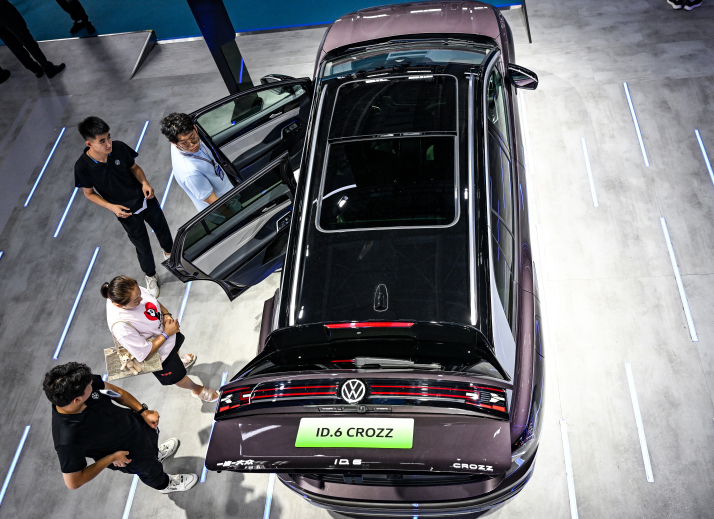| Pacific Dialogue |
| In the name of 'fairness' | |
|
|
 Consumers take a look at a new-energy vehicle at the booth of FAW-Volkswagen, a Sino-German joint venture automaker, at the 20th Changchun International Auto Expo in Changchun, Jilin Province, on July 20 (XINHUA)
On September 13, European Commission President Ursula von der Leyen announced the European Union is launching an anti-subsidy investigation into electric vehicles (EVs) coming from China to decide whether to impose punitive tariffs. "Flooded," "cheaper," "state subsidies." These three key words are the labels given to Chinese EVs by the EU's top official, which to some extent mold the stereotype of Chinese goods. However, is it true? Are Chinese EVs "flooding" in the European market? According to French auto consultancy Inovev, of new EVs sold in Europe this year, 8 percent were made by Chinese brands, up from 6 percent last year and 4 percent in 2021. Europeans purchased 945,000 battery EVs in the first half of 2023. In terms of market share, U.S. EV manufacturer Tesla held its position as the biggest winner, selling 138,814 Model Y and 43,131 Model 3 units, ranking first and second on the bestseller list; the Volvo XC40, Volkswagen ID.4, and Volkswagen ID.3 came in third, fourth, and fifth. No Chinese brands were present in the top 20. Most potential EV buyers in Europe are unfamiliar with Chinese brands. A survey conducted by YouGov in 2022 showed that only 14 percent of 1,629 German consumers had heard of China's top EV brand BYD, which was at the time the world's second largest EV maker after Tesla. As the highest selling Chinese EV brand in Europe, BYD sold only 4,083 vehicles there in 2022. Are Chinese EVs cheaper than others in Europe? This is a topic that has been discussed by both Chinese and Europeans for a long time. A basic consensus has been reached that Chinese brands are not cheap in Europe, but European brands sell cheaper in China. At the International Motor Show (IAA MOBILITY 2023), one of the world's largest mobility trade fairs, held from September 5 to 10 in Munich, Germany, BYD announced that the price of its Seal model starts at 44,990 euros (excluding bonuses) ($47,955) on European soil, while the highest configuration of the car in China is only about 36,000 euros ($38,372). Another example is Volkswagen ID.3. The starting price is only around 16,000 euros ($17,054) in China, which means the ID.3 costs roughly half as much in China as it does in Europe. The explanation given by Volkswagen is that the main suppliers of this model are from China, and that shorter transportation routes and lower production costs made it cheaper in the Chinese market. A business analysis published by Reuters on August 18 cited researchers at Jato Dynamics, a global automotive market research company based in the UK, as saying the average price of an EV in China was less than 32,000 euros ($34,109) in the first half of 2022 compared with around 56,000 euros ($59,690) in Europe, "but Chinese brands are likely to struggle to sell cars in Europe as cheaply as at home," because logistics, sales taxes, import duty and meeting European certification requirements all add costs. Do Chinese EV makers enjoy huge state subsidies? The answer is no. In 2009, the Chinese Government began to encourage the purchase of EVs, and further clarified the subsidy policy in 2012 for multiple considerations, especially smog control. The scope of subsidies has gradually narrowed since 2018, and finally the state-level subsidies were terminated at the end of 2022. At present, some local governments still provide certain subsidies for the construction of new infrastructure such as charging piles, which barely impact on overseas markets. The competitiveness of Chinese brands has indeed become increasingly obvious. The advantage of China's EV industry lies in its complete industrial chain and world-leading battery production technology, as well as a large potential market with a domestic population of more than 1.4 billion. The fierce competition in China's EV market is second to none globally, which is constantly forcing companies to increase innovation. However, even if Chinese EVs cost less, why shouldn't European consumers accept a cheaper offer especially when the economy is worse? It is understandable that the purpose of the EU's anti-subsidy investigation is to protect local enterprises, but the EU's rash engagement in trade protectionism has nothing to do with "fairness." Copyedited by G.P. Wilson Comments to liangxiao@cicgamericas.com |
|
||||||||||||||||||||||||||||||
|